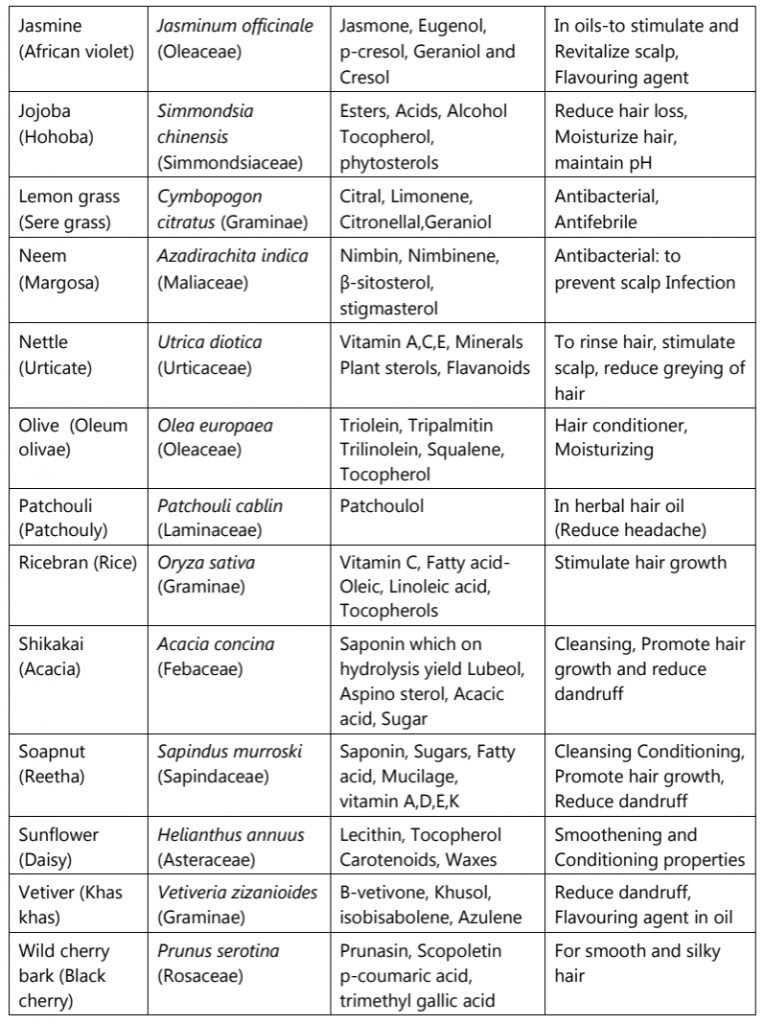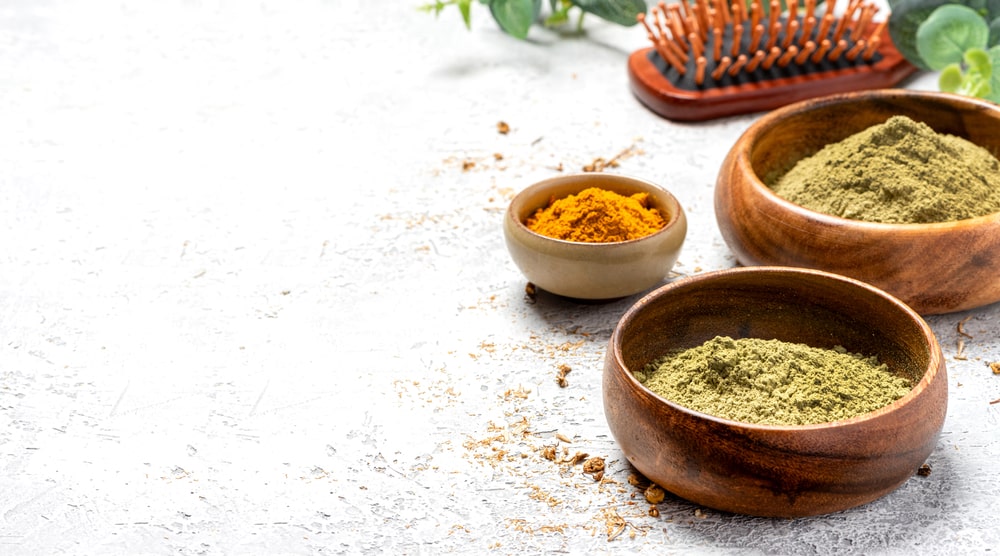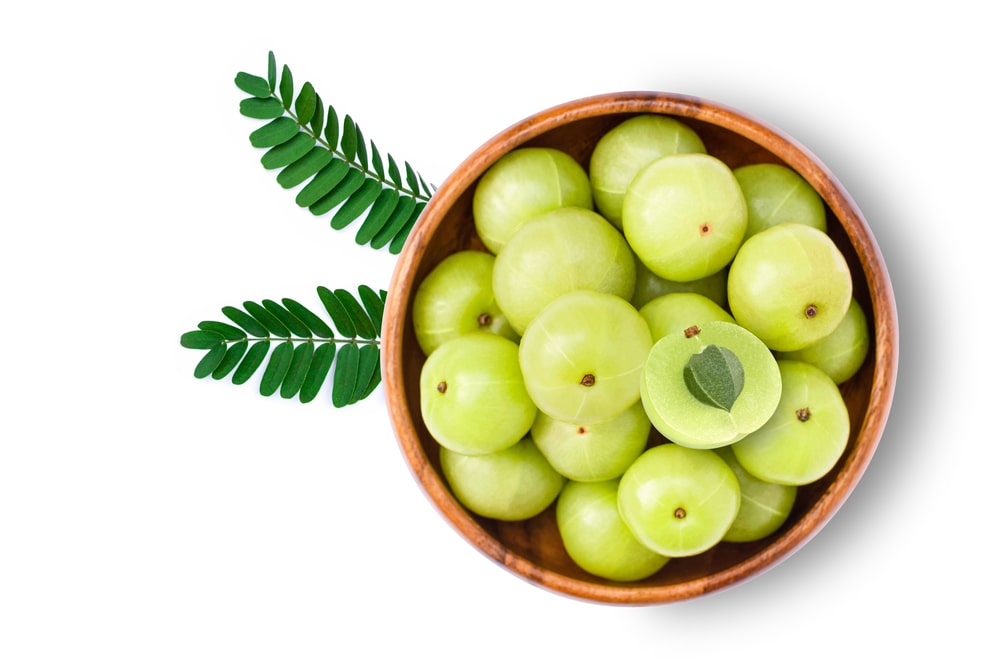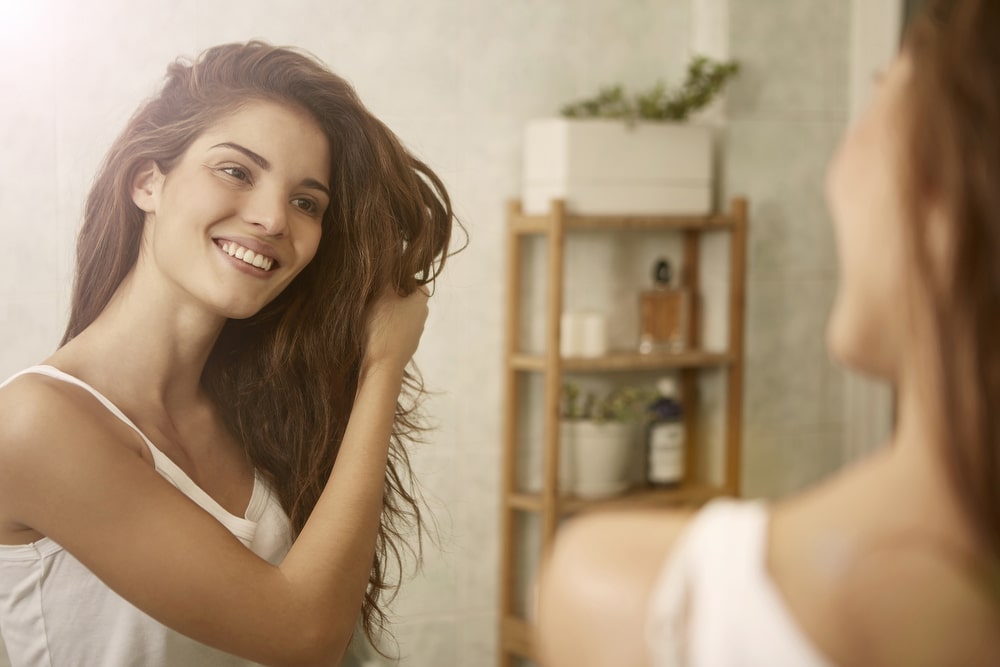Herbal Cosmetics for Hair Care: Hair nourishment and grooming aids have become increasingly popular throughout the world. Preparations available in the market for men include hair creams, liquid brilliantines, pomades and solid brilliantines, tonics, lotions and conditioners and for women wave sets, hair sprays, special rinses and lotions, brilliantines and conditioners. Several herbal plants are utilized in hair care formulations. The herbal plants which are used in hair-care formulations can be classified into the following groups: (i) Plants used as hair cleansers, (ii) Plants used as a hair dyeing agent, (iii) Plants used as anti-dandruff and (iv) Plants used as hair tonic/hair health promotion of growth.
(i) Plants used as hair cleansers: Acacia concinna (Shikakai), Cydonia oblonga (Bihi), Sapindus mukorrossi (Ritha), Trigonella foenum-graecum (Methi).
(ii) Plants used as hair dyeing agents: Acacia arabica (Kikkar), Cydonia oblonga (Bihi), Eclipta alba (Bhringraj), Haematoxylon campechianum (Patang), Hibiscus Rosa Sinensis (Gudhal), Juglans regia (Akhrot), Lawsonia inermis (Henna), Terminalia belerica (Behera).
(iii) Plants used as anti-dandruff agents: Arctium lappa (Great burdock), Betula pendula (Birch), Calendula officials (Gule-abbas), Urtica dioica (Stinging nettle).
(iv) Plants used as hair tonic/hair nourisher: Annica Montana (Arnica), Eclipta alba (Bhringraj), Morus alba (Shatoot), Nardostachys jatamansi (Jatamansi), Phyllanthus Emblica (Amla).
A large number of plants are used in hair care products. Some of them are summarized in Table.1 below:
Table.1


Henna
Henna comes from the plant Lawsonia inermis family Lythraceae, contains a dye molecule called lawsone. Besides lawsone, other constituents present are gallic acid, glucose, mannitol, fats, resin (2%), mucilage and traces of an alkaloid. Leaves yield hennatannic acid and an olive oil green resin, soluble in ether and alcohol. Lawsone isolated from the leaves of L. inermis has shown a significant antifungal antibiotic effect. Henna inflects numerous beneficial effects on hair. These include:
- Making hair stronger.
- Increasing the hair volume
- Resistance to hair breakage.
- Reduction in split ends of hair.
- Used as a regular dye.
- Shows an antidandruff effect and can eliminate head lice.
- Possesses antifungal and antibiotic effects.
- Shows astringent property.
- Reduce some inflammations.
Henna contains tannin, which is an astringent. The use of henna in the hair helps to tighten the surface of the scalp, or dye molecule that strengthens the follicles’ grasp on each hair, thus making hair stronger. Henna penetrates the hair shaft, strengthens it, smoothes the cuticle, thickens and volumizes the hair, and makes hair more resistant to breakage. The henna dye helps to protect against UV rays from the sun, while also strengthening hair. There is no black, neutral, brown, auburn, or any colour of the rainbow henna—just natural henna with a variation of shades from orange to reddish-brown. The results from the henna stain on the skin and body depend on the levels of keratin in the hair, skin or fibre, and also depends on the quality and freshness of the henna, how long the paste was on the area of application, and the quality of the henna paste.
Henna also possess antifungal properties and has some proven antibacterial activities as well. Henna can eliminate fungal dermatophytes living in the skin such as the tinea and masalezzia. These fungi can cause superficial infections of the skin, hair and nails. Some examples are dandruff, ringworm, athletes’ foot, and fungal infections of the nails. Henna can also reduce some inflammations and can eliminate head lice. These simple remedies only require applying henna paste to the area of discomfort or infection and keeping it on the skin long enough for the lawsone to penetrate; no complicated formulation is necessary to achieve good results. Henna can eliminate dandruff when caused by Malassezia furfur, a species of fungus naturally found on the skin surfaces of humans and many animals. This fungus consumes the oils from the skin, and in humans, often inhabits the scalp. Most people who use henna regularly to dye their hair have no dandruff. People who have dandruff caused by M. furfur may experience a sudden fall of dandruff after the first application of henna: this is because when henna kills off the fungus, the outermost layer of infected skin exfoliates. Healthy skin remains and flourishes. Henna can eliminate most tinea dermatophytosis in a single application of henna paste. A single topical application of henna paste can effectively relieve Tinea pedis (athlete’s foot), Tinea cruris (jock itch) which affects the groin area, Tinea capitis which affects the scalp, and Tinea barbae which affects facial hair. Henna will stain hair and skin when applied to these areas. A single application is sufficient to rid the area of tinea until the stain has exfoliated. Repeated applications of henna paste can relieve Tinea unguium which affects the fingernails and toenails.

Usage of Henna in cosmeceuticals for colouring hair has indulged for many decades, like ancient kings, queens used to mix it up with some powerful herbs to colour their hair. Henna is a natural herbal powder that is not only used for colouring hair but also helps to prevent dandruff and scalp itching. It acts as a good conditioner for your hair and helps to grow your hair. Recently several products having henna powder are available in the market which claims for hair colouring. These products contain either henna powder alone or with a mixture of other natural plant powders including amla powder, shikari powder, tulsi powder and bringraj powder. Sometimes egg white and lemon juice are also added to these products. Usually, these products are applied twice a month (or more, according to hair condition) makes hair glossy, healthy or voluminous. These natural cosmetic products are the best and safest way to colour hair that has no ammonia, chemicals, and toxins. The most important thing to have gorgeous hair with henna is to select the right quality henna from a good brand.
The next important and popular product of henna is henna oil for hair growth. Henna oil for natural hair is really useful that provides a healthy glow and volume to it and makes it shine with all its might. Henna oil is prepared by extraction of henna powder in oils. Gingili oil, mustard oil, castor oil, coconut oil and some other vegetable oils can be used for the extraction of henna. Henna Oil is for hair growth. It has properties that help to repair hair cuticles, making hair strands thick and strong. Henna helps give volume to the hair shaft and improves hair texture making it look beautiful, silky and strong. It is a soothing conditioner for hair and scalp. It not only helps to add shine and volume to it but also protects it from further damage by forming a protective coat over it.
Amla (Emblica officinalis)
Amla is the name given to the fruit of a small leafy tree (Emblica officinalis), which grows throughout India and bears edible fruit. This fruit is highly prized both for its high vitamin C content and for the precious oil, which is extracted from its seeds and pulp and used as a treatment for hair and scalp problems. Antioxidants prevent hair from premature ageing and greying. This herb has many phytoconstituents including apigenin, gallic acid, ellagic acid, chebulinic acid, quercetin, chebulagic acid, corilagin, isostrictiniin, methyl gallate and luteolin. Tannins in amla include phyllaemblicin B, emblicanin A, emblicanin B, punigluconin and pedunculagin. Amla powder contains essential fatty acids that help in promoting hair growth.
Amla offers numerous beneficial effects for hairs which include:
- Nourishes hair, making it thicker and stronger.
- Provides lustre to hair that is dull and dry.
- Controls premature greying of the hair
- Moisturizes the scalp to help to control dandruff and other issues related to the scalp.
Indian gooseberry or amla is an accepted hair tonic in traditional recipes for enriching hair growth and pigmentation. The fruit, cut into pieces is dried preferably in the shade. These pieces are boiled in coconut oil till the solid matter becomes charred. This darkish oil is excellent in preventing greying. The water in which dried Amla pieces are soaked overnight is also nourishing to hair and can be used for the last rinse while washing the hair.

Amla hair oil (coconut or sesame oil infused with dried amla pieces/powder) is one of the most promising herbal cosmetics used for hair care rituals in Indian culture. This hair oil acts as a natural conditioner, minimizes hair loss and greying, and encourages strong and healthy hair growth. Besides essential fatty acids, amla oil is rich in vitamin C, flavonoids, polyphenols, and also contain water, protein, carbohydrates, vitamins and minerals which are essentials for hair growth. Amla hair oil use may provide some of the benefits, such as the antioxidant effects, as well as the antifungal and antiviral. Some darkening of the hair may also occur over time with repeated use, although this seems less likely than with amla powder. Ayurvedic amla hair oil is also available with other potent herbal extracts: Reetha, Shikakai, Henna and Methi, all prized for their natural cleansing, nourishing and rejuvenating effect on the hair and scalp.
Amla hair shampoo is also very popular in the Asian market, especially in India. Amla shampoo either alone or with other natural constituents (bhringraj, neem, heena) is good for the scalp. It eradicates pollutants from the scalp. These amla shampoos make hair strong from the roots and make it grow faster. Amla shampoo repairs hair from the roots and decrease the rate of hair loss and make scalp infection-free. Sometimes natural conditioners are also added to this shampoo which will make hair soft, smooth and bouncy.
Make sure you also check our other amazing Article on : Herbal Cosmetics for Skin Care
